Organizational Behaviour Analysis: BBC Culture, Motivation, Teams
VerifiedAdded on 2020/06/06
|13
|4158
|499
Report
AI Summary
This report provides an in-depth analysis of organizational behaviour within the British Broadcasting Corporation (BBC). It begins by examining the historical organizational culture, including the influence of power and politics, and discusses the shift from a power-based culture to a more democratic and people-oriented approach. The report then explores motivational theories, differentiating between content and process theories, and evaluates their application in enhancing team effectiveness within the BBC. Furthermore, it addresses the importance of different team types and provides strategies for improving team performance. The analysis also highlights how improved employee motivation contributes to the achievement of organizational goals, referencing specific changes implemented by the BBC's leadership to foster a more positive and productive work environment. The report concludes by summarizing the key findings and implications of the BBC's organizational behaviour practices.
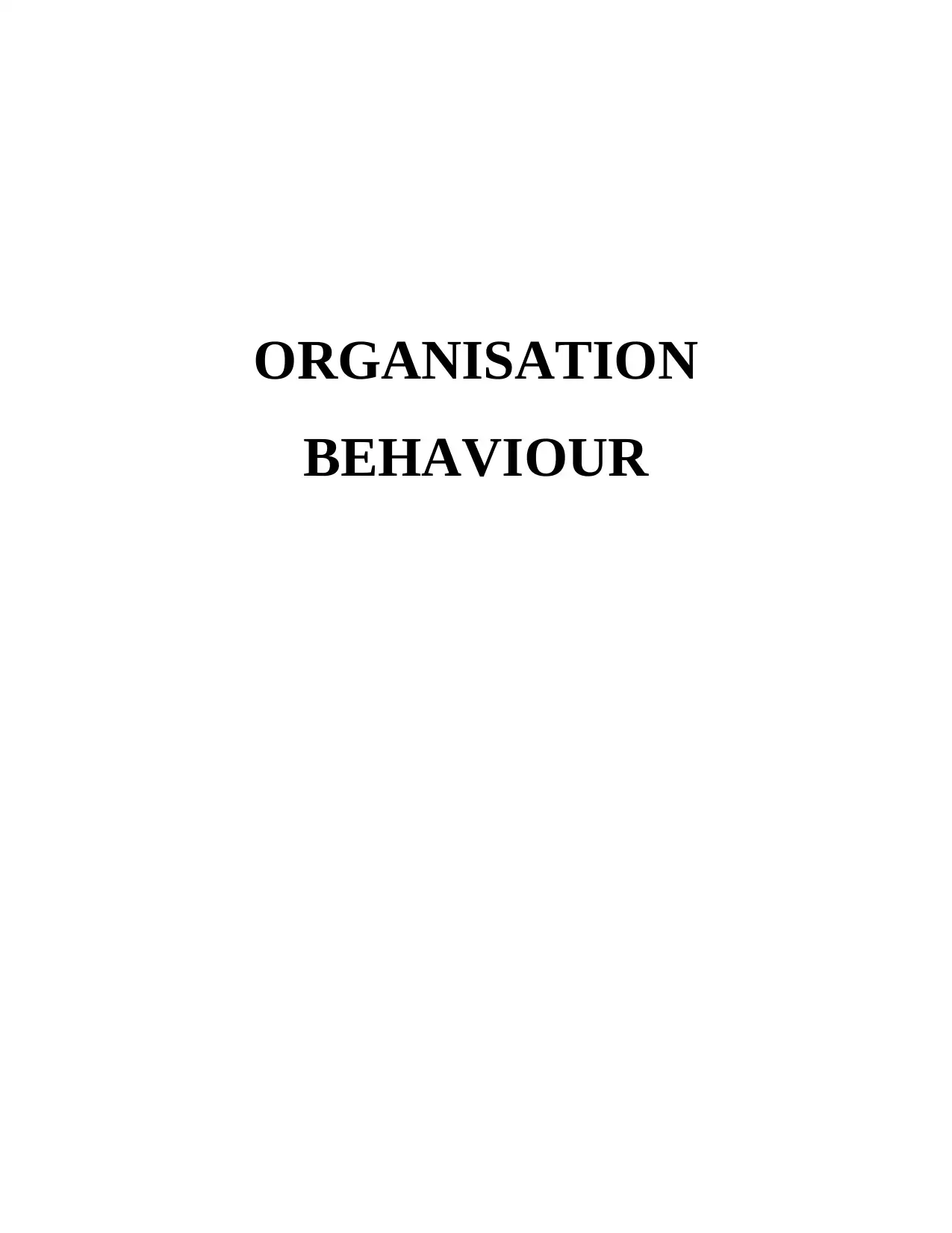
ORGANISATION
BEHAVIOUR
BEHAVIOUR
Paraphrase This Document
Need a fresh take? Get an instant paraphrase of this document with our AI Paraphraser
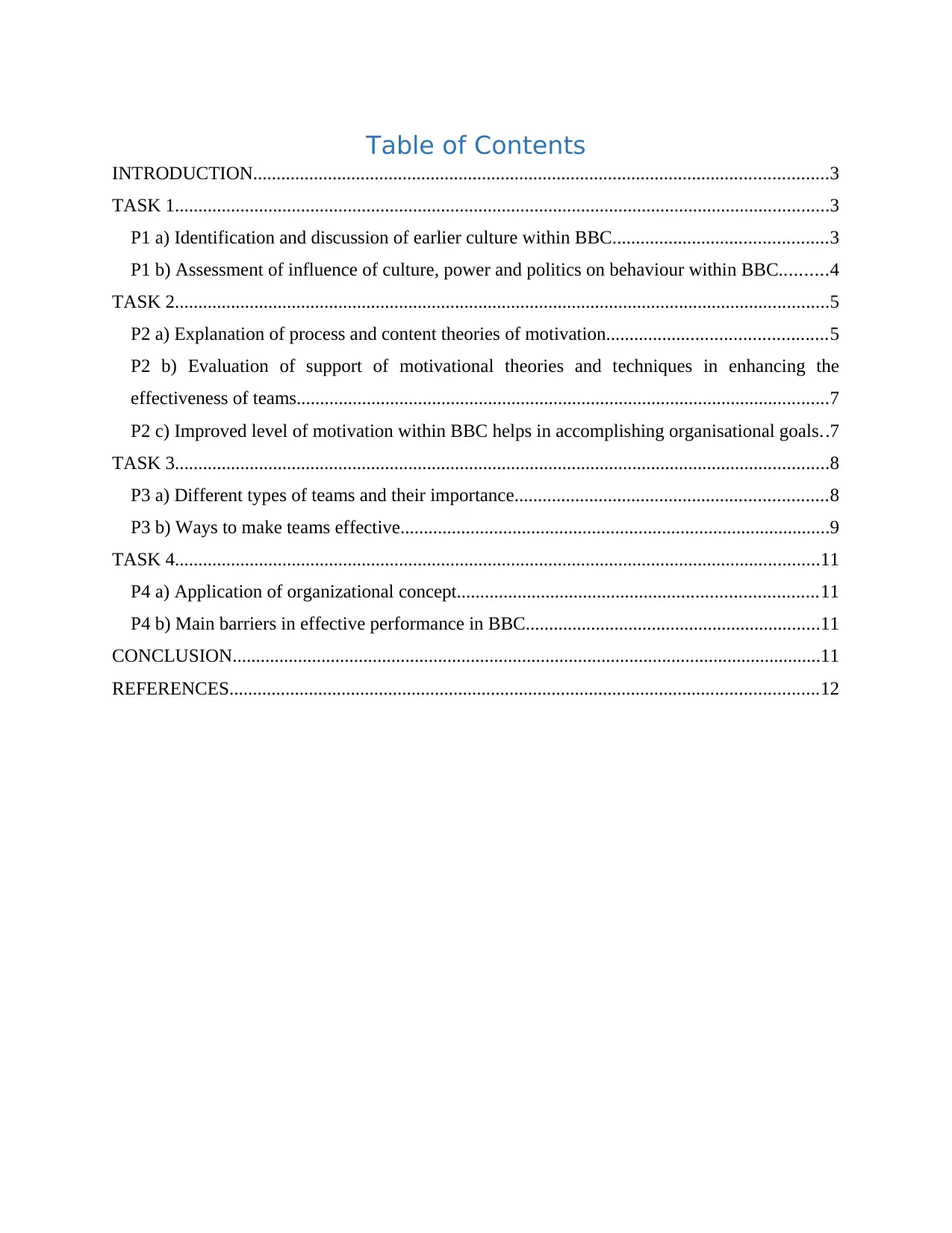
Table of Contents
INTRODUCTION...........................................................................................................................3
TASK 1............................................................................................................................................3
P1 a) Identification and discussion of earlier culture within BBC..............................................3
P1 b) Assessment of influence of culture, power and politics on behaviour within BBC..........4
TASK 2............................................................................................................................................5
P2 a) Explanation of process and content theories of motivation...............................................5
P2 b) Evaluation of support of motivational theories and techniques in enhancing the
effectiveness of teams..................................................................................................................7
P2 c) Improved level of motivation within BBC helps in accomplishing organisational goals..7
TASK 3............................................................................................................................................8
P3 a) Different types of teams and their importance...................................................................8
P3 b) Ways to make teams effective............................................................................................9
TASK 4..........................................................................................................................................11
P4 a) Application of organizational concept.............................................................................11
P4 b) Main barriers in effective performance in BBC...............................................................11
CONCLUSION..............................................................................................................................11
REFERENCES..............................................................................................................................12
INTRODUCTION...........................................................................................................................3
TASK 1............................................................................................................................................3
P1 a) Identification and discussion of earlier culture within BBC..............................................3
P1 b) Assessment of influence of culture, power and politics on behaviour within BBC..........4
TASK 2............................................................................................................................................5
P2 a) Explanation of process and content theories of motivation...............................................5
P2 b) Evaluation of support of motivational theories and techniques in enhancing the
effectiveness of teams..................................................................................................................7
P2 c) Improved level of motivation within BBC helps in accomplishing organisational goals..7
TASK 3............................................................................................................................................8
P3 a) Different types of teams and their importance...................................................................8
P3 b) Ways to make teams effective............................................................................................9
TASK 4..........................................................................................................................................11
P4 a) Application of organizational concept.............................................................................11
P4 b) Main barriers in effective performance in BBC...............................................................11
CONCLUSION..............................................................................................................................11
REFERENCES..............................................................................................................................12
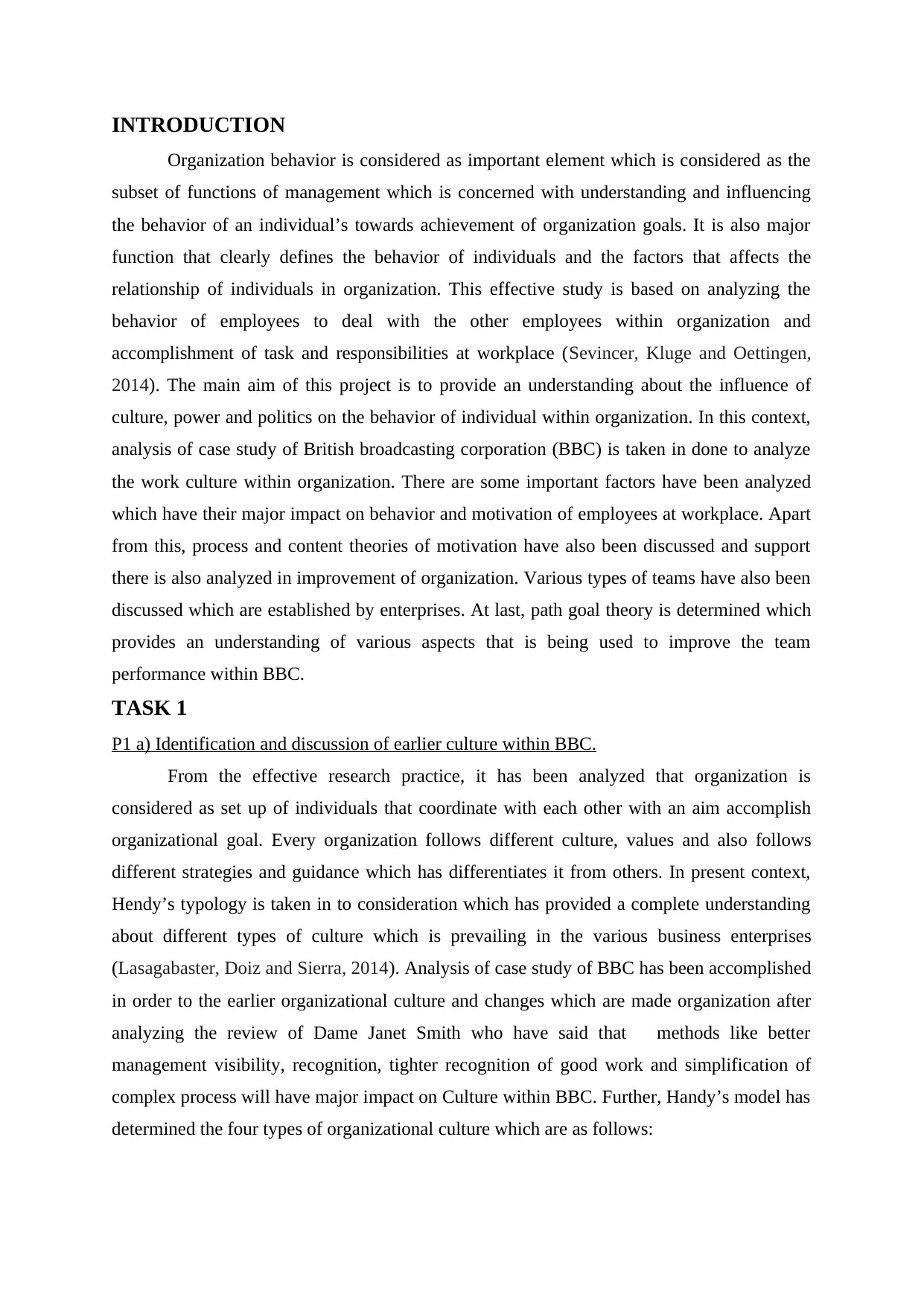
INTRODUCTION
Organization behavior is considered as important element which is considered as the
subset of functions of management which is concerned with understanding and influencing
the behavior of an individual’s towards achievement of organization goals. It is also major
function that clearly defines the behavior of individuals and the factors that affects the
relationship of individuals in organization. This effective study is based on analyzing the
behavior of employees to deal with the other employees within organization and
accomplishment of task and responsibilities at workplace (Sevincer, Kluge and Oettingen,
2014). The main aim of this project is to provide an understanding about the influence of
culture, power and politics on the behavior of individual within organization. In this context,
analysis of case study of British broadcasting corporation (BBC) is taken in done to analyze
the work culture within organization. There are some important factors have been analyzed
which have their major impact on behavior and motivation of employees at workplace. Apart
from this, process and content theories of motivation have also been discussed and support
there is also analyzed in improvement of organization. Various types of teams have also been
discussed which are established by enterprises. At last, path goal theory is determined which
provides an understanding of various aspects that is being used to improve the team
performance within BBC.
TASK 1
P1 a) Identification and discussion of earlier culture within BBC.
From the effective research practice, it has been analyzed that organization is
considered as set up of individuals that coordinate with each other with an aim accomplish
organizational goal. Every organization follows different culture, values and also follows
different strategies and guidance which has differentiates it from others. In present context,
Hendy’s typology is taken in to consideration which has provided a complete understanding
about different types of culture which is prevailing in the various business enterprises
(Lasagabaster, Doiz and Sierra, 2014). Analysis of case study of BBC has been accomplished
in order to the earlier organizational culture and changes which are made organization after
analyzing the review of Dame Janet Smith who have said that methods like better
management visibility, recognition, tighter recognition of good work and simplification of
complex process will have major impact on Culture within BBC. Further, Handy’s model has
determined the four types of organizational culture which are as follows:
Organization behavior is considered as important element which is considered as the
subset of functions of management which is concerned with understanding and influencing
the behavior of an individual’s towards achievement of organization goals. It is also major
function that clearly defines the behavior of individuals and the factors that affects the
relationship of individuals in organization. This effective study is based on analyzing the
behavior of employees to deal with the other employees within organization and
accomplishment of task and responsibilities at workplace (Sevincer, Kluge and Oettingen,
2014). The main aim of this project is to provide an understanding about the influence of
culture, power and politics on the behavior of individual within organization. In this context,
analysis of case study of British broadcasting corporation (BBC) is taken in done to analyze
the work culture within organization. There are some important factors have been analyzed
which have their major impact on behavior and motivation of employees at workplace. Apart
from this, process and content theories of motivation have also been discussed and support
there is also analyzed in improvement of organization. Various types of teams have also been
discussed which are established by enterprises. At last, path goal theory is determined which
provides an understanding of various aspects that is being used to improve the team
performance within BBC.
TASK 1
P1 a) Identification and discussion of earlier culture within BBC.
From the effective research practice, it has been analyzed that organization is
considered as set up of individuals that coordinate with each other with an aim accomplish
organizational goal. Every organization follows different culture, values and also follows
different strategies and guidance which has differentiates it from others. In present context,
Hendy’s typology is taken in to consideration which has provided a complete understanding
about different types of culture which is prevailing in the various business enterprises
(Lasagabaster, Doiz and Sierra, 2014). Analysis of case study of BBC has been accomplished
in order to the earlier organizational culture and changes which are made organization after
analyzing the review of Dame Janet Smith who have said that methods like better
management visibility, recognition, tighter recognition of good work and simplification of
complex process will have major impact on Culture within BBC. Further, Handy’s model has
determined the four types of organizational culture which are as follows:
⊘ This is a preview!⊘
Do you want full access?
Subscribe today to unlock all pages.

Trusted by 1+ million students worldwide
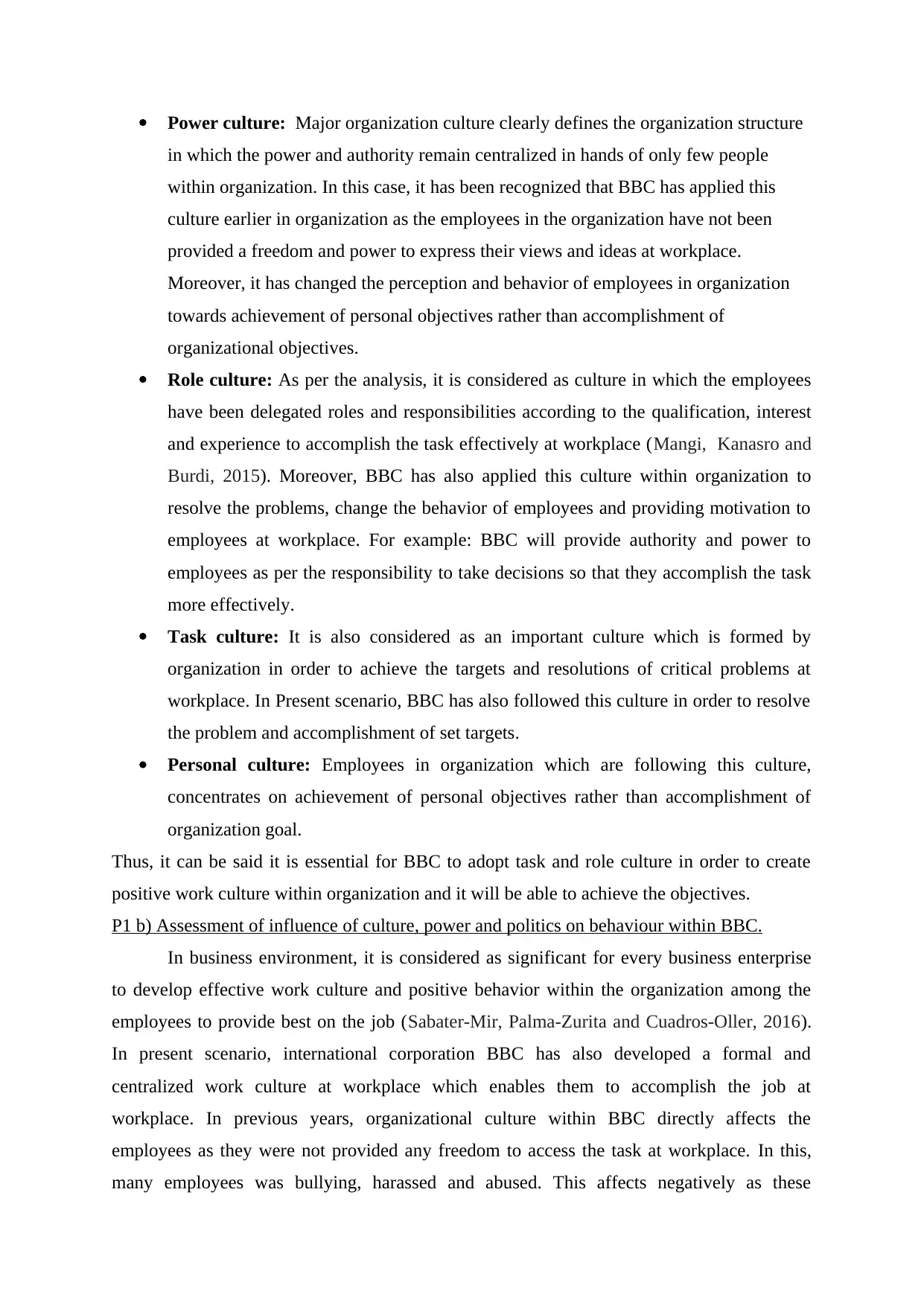
Power culture: Major organization culture clearly defines the organization structure
in which the power and authority remain centralized in hands of only few people
within organization. In this case, it has been recognized that BBC has applied this
culture earlier in organization as the employees in the organization have not been
provided a freedom and power to express their views and ideas at workplace.
Moreover, it has changed the perception and behavior of employees in organization
towards achievement of personal objectives rather than accomplishment of
organizational objectives.
Role culture: As per the analysis, it is considered as culture in which the employees
have been delegated roles and responsibilities according to the qualification, interest
and experience to accomplish the task effectively at workplace (Mangi, Kanasro and
Burdi, 2015). Moreover, BBC has also applied this culture within organization to
resolve the problems, change the behavior of employees and providing motivation to
employees at workplace. For example: BBC will provide authority and power to
employees as per the responsibility to take decisions so that they accomplish the task
more effectively.
Task culture: It is also considered as an important culture which is formed by
organization in order to achieve the targets and resolutions of critical problems at
workplace. In Present scenario, BBC has also followed this culture in order to resolve
the problem and accomplishment of set targets.
Personal culture: Employees in organization which are following this culture,
concentrates on achievement of personal objectives rather than accomplishment of
organization goal.
Thus, it can be said it is essential for BBC to adopt task and role culture in order to create
positive work culture within organization and it will be able to achieve the objectives.
P1 b) Assessment of influence of culture, power and politics on behaviour within BBC.
In business environment, it is considered as significant for every business enterprise
to develop effective work culture and positive behavior within the organization among the
employees to provide best on the job (Sabater-Mir, Palma-Zurita and Cuadros-Oller, 2016).
In present scenario, international corporation BBC has also developed a formal and
centralized work culture at workplace which enables them to accomplish the job at
workplace. In previous years, organizational culture within BBC directly affects the
employees as they were not provided any freedom to access the task at workplace. In this,
many employees was bullying, harassed and abused. This affects negatively as these
in which the power and authority remain centralized in hands of only few people
within organization. In this case, it has been recognized that BBC has applied this
culture earlier in organization as the employees in the organization have not been
provided a freedom and power to express their views and ideas at workplace.
Moreover, it has changed the perception and behavior of employees in organization
towards achievement of personal objectives rather than accomplishment of
organizational objectives.
Role culture: As per the analysis, it is considered as culture in which the employees
have been delegated roles and responsibilities according to the qualification, interest
and experience to accomplish the task effectively at workplace (Mangi, Kanasro and
Burdi, 2015). Moreover, BBC has also applied this culture within organization to
resolve the problems, change the behavior of employees and providing motivation to
employees at workplace. For example: BBC will provide authority and power to
employees as per the responsibility to take decisions so that they accomplish the task
more effectively.
Task culture: It is also considered as an important culture which is formed by
organization in order to achieve the targets and resolutions of critical problems at
workplace. In Present scenario, BBC has also followed this culture in order to resolve
the problem and accomplishment of set targets.
Personal culture: Employees in organization which are following this culture,
concentrates on achievement of personal objectives rather than accomplishment of
organization goal.
Thus, it can be said it is essential for BBC to adopt task and role culture in order to create
positive work culture within organization and it will be able to achieve the objectives.
P1 b) Assessment of influence of culture, power and politics on behaviour within BBC.
In business environment, it is considered as significant for every business enterprise
to develop effective work culture and positive behavior within the organization among the
employees to provide best on the job (Sabater-Mir, Palma-Zurita and Cuadros-Oller, 2016).
In present scenario, international corporation BBC has also developed a formal and
centralized work culture at workplace which enables them to accomplish the job at
workplace. In previous years, organizational culture within BBC directly affects the
employees as they were not provided any freedom to access the task at workplace. In this,
many employees was bullying, harassed and abused. This affects negatively as these
Paraphrase This Document
Need a fresh take? Get an instant paraphrase of this document with our AI Paraphraser
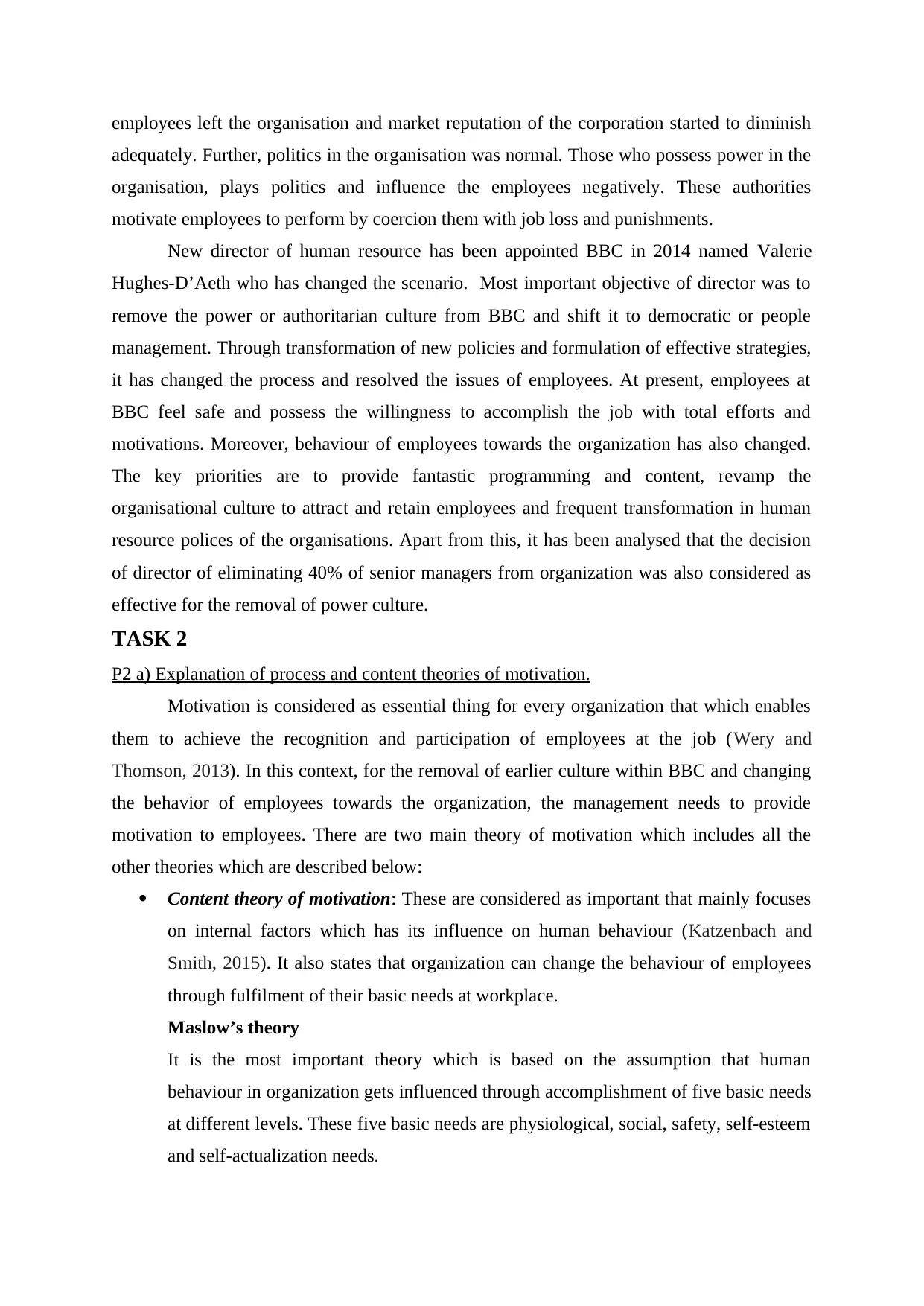
employees left the organisation and market reputation of the corporation started to diminish
adequately. Further, politics in the organisation was normal. Those who possess power in the
organisation, plays politics and influence the employees negatively. These authorities
motivate employees to perform by coercion them with job loss and punishments.
New director of human resource has been appointed BBC in 2014 named Valerie
Hughes-D’Aeth who has changed the scenario. Most important objective of director was to
remove the power or authoritarian culture from BBC and shift it to democratic or people
management. Through transformation of new policies and formulation of effective strategies,
it has changed the process and resolved the issues of employees. At present, employees at
BBC feel safe and possess the willingness to accomplish the job with total efforts and
motivations. Moreover, behaviour of employees towards the organization has also changed.
The key priorities are to provide fantastic programming and content, revamp the
organisational culture to attract and retain employees and frequent transformation in human
resource polices of the organisations. Apart from this, it has been analysed that the decision
of director of eliminating 40% of senior managers from organization was also considered as
effective for the removal of power culture.
TASK 2
P2 a) Explanation of process and content theories of motivation.
Motivation is considered as essential thing for every organization that which enables
them to achieve the recognition and participation of employees at the job (Wery and
Thomson, 2013). In this context, for the removal of earlier culture within BBC and changing
the behavior of employees towards the organization, the management needs to provide
motivation to employees. There are two main theory of motivation which includes all the
other theories which are described below:
Content theory of motivation: These are considered as important that mainly focuses
on internal factors which has its influence on human behaviour (Katzenbach and
Smith, 2015). It also states that organization can change the behaviour of employees
through fulfilment of their basic needs at workplace.
Maslow’s theory
It is the most important theory which is based on the assumption that human
behaviour in organization gets influenced through accomplishment of five basic needs
at different levels. These five basic needs are physiological, social, safety, self-esteem
and self-actualization needs.
adequately. Further, politics in the organisation was normal. Those who possess power in the
organisation, plays politics and influence the employees negatively. These authorities
motivate employees to perform by coercion them with job loss and punishments.
New director of human resource has been appointed BBC in 2014 named Valerie
Hughes-D’Aeth who has changed the scenario. Most important objective of director was to
remove the power or authoritarian culture from BBC and shift it to democratic or people
management. Through transformation of new policies and formulation of effective strategies,
it has changed the process and resolved the issues of employees. At present, employees at
BBC feel safe and possess the willingness to accomplish the job with total efforts and
motivations. Moreover, behaviour of employees towards the organization has also changed.
The key priorities are to provide fantastic programming and content, revamp the
organisational culture to attract and retain employees and frequent transformation in human
resource polices of the organisations. Apart from this, it has been analysed that the decision
of director of eliminating 40% of senior managers from organization was also considered as
effective for the removal of power culture.
TASK 2
P2 a) Explanation of process and content theories of motivation.
Motivation is considered as essential thing for every organization that which enables
them to achieve the recognition and participation of employees at the job (Wery and
Thomson, 2013). In this context, for the removal of earlier culture within BBC and changing
the behavior of employees towards the organization, the management needs to provide
motivation to employees. There are two main theory of motivation which includes all the
other theories which are described below:
Content theory of motivation: These are considered as important that mainly focuses
on internal factors which has its influence on human behaviour (Katzenbach and
Smith, 2015). It also states that organization can change the behaviour of employees
through fulfilment of their basic needs at workplace.
Maslow’s theory
It is the most important theory which is based on the assumption that human
behaviour in organization gets influenced through accomplishment of five basic needs
at different levels. These five basic needs are physiological, social, safety, self-esteem
and self-actualization needs.
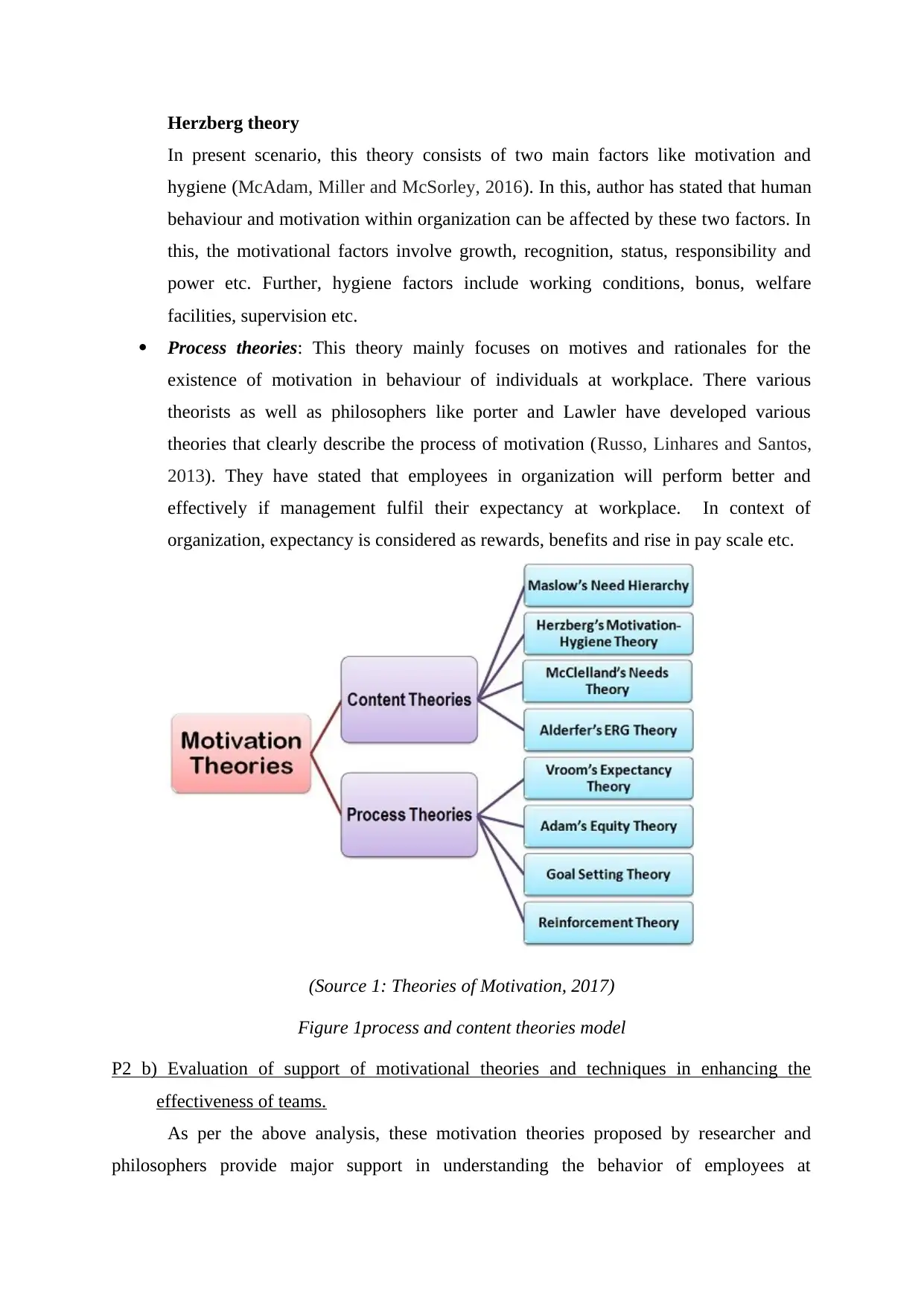
Herzberg theory
In present scenario, this theory consists of two main factors like motivation and
hygiene (McAdam, Miller and McSorley, 2016). In this, author has stated that human
behaviour and motivation within organization can be affected by these two factors. In
this, the motivational factors involve growth, recognition, status, responsibility and
power etc. Further, hygiene factors include working conditions, bonus, welfare
facilities, supervision etc.
Process theories: This theory mainly focuses on motives and rationales for the
existence of motivation in behaviour of individuals at workplace. There various
theorists as well as philosophers like porter and Lawler have developed various
theories that clearly describe the process of motivation (Russo, Linhares and Santos,
2013). They have stated that employees in organization will perform better and
effectively if management fulfil their expectancy at workplace. In context of
organization, expectancy is considered as rewards, benefits and rise in pay scale etc.
(Source 1: Theories of Motivation, 2017)
Figure 1process and content theories model
P2 b) Evaluation of support of motivational theories and techniques in enhancing the
effectiveness of teams.
As per the above analysis, these motivation theories proposed by researcher and
philosophers provide major support in understanding the behavior of employees at
In present scenario, this theory consists of two main factors like motivation and
hygiene (McAdam, Miller and McSorley, 2016). In this, author has stated that human
behaviour and motivation within organization can be affected by these two factors. In
this, the motivational factors involve growth, recognition, status, responsibility and
power etc. Further, hygiene factors include working conditions, bonus, welfare
facilities, supervision etc.
Process theories: This theory mainly focuses on motives and rationales for the
existence of motivation in behaviour of individuals at workplace. There various
theorists as well as philosophers like porter and Lawler have developed various
theories that clearly describe the process of motivation (Russo, Linhares and Santos,
2013). They have stated that employees in organization will perform better and
effectively if management fulfil their expectancy at workplace. In context of
organization, expectancy is considered as rewards, benefits and rise in pay scale etc.
(Source 1: Theories of Motivation, 2017)
Figure 1process and content theories model
P2 b) Evaluation of support of motivational theories and techniques in enhancing the
effectiveness of teams.
As per the above analysis, these motivation theories proposed by researcher and
philosophers provide major support in understanding the behavior of employees at
⊘ This is a preview!⊘
Do you want full access?
Subscribe today to unlock all pages.

Trusted by 1+ million students worldwide
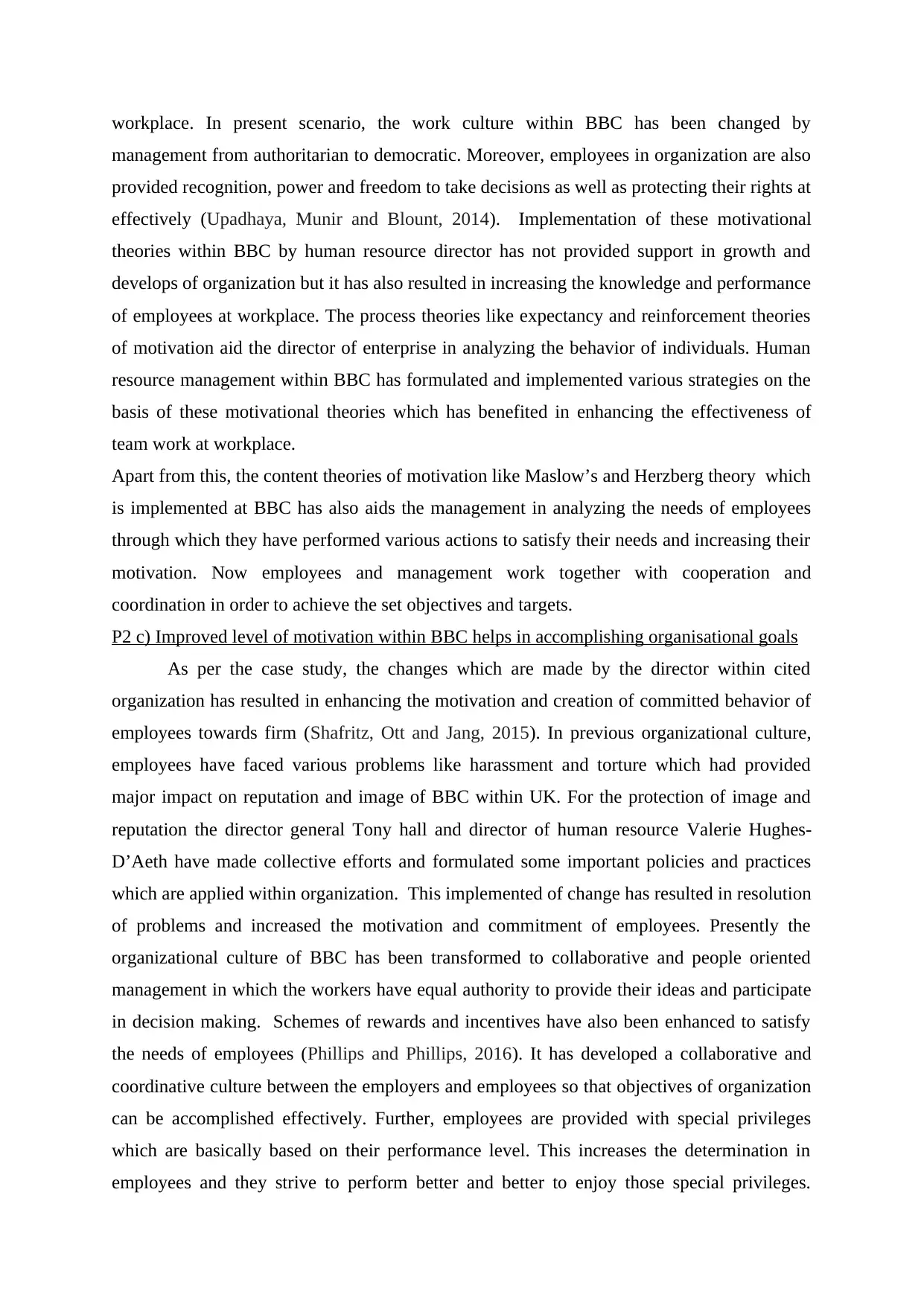
workplace. In present scenario, the work culture within BBC has been changed by
management from authoritarian to democratic. Moreover, employees in organization are also
provided recognition, power and freedom to take decisions as well as protecting their rights at
effectively (Upadhaya, Munir and Blount, 2014). Implementation of these motivational
theories within BBC by human resource director has not provided support in growth and
develops of organization but it has also resulted in increasing the knowledge and performance
of employees at workplace. The process theories like expectancy and reinforcement theories
of motivation aid the director of enterprise in analyzing the behavior of individuals. Human
resource management within BBC has formulated and implemented various strategies on the
basis of these motivational theories which has benefited in enhancing the effectiveness of
team work at workplace.
Apart from this, the content theories of motivation like Maslow’s and Herzberg theory which
is implemented at BBC has also aids the management in analyzing the needs of employees
through which they have performed various actions to satisfy their needs and increasing their
motivation. Now employees and management work together with cooperation and
coordination in order to achieve the set objectives and targets.
P2 c) Improved level of motivation within BBC helps in accomplishing organisational goals
As per the case study, the changes which are made by the director within cited
organization has resulted in enhancing the motivation and creation of committed behavior of
employees towards firm (Shafritz, Ott and Jang, 2015). In previous organizational culture,
employees have faced various problems like harassment and torture which had provided
major impact on reputation and image of BBC within UK. For the protection of image and
reputation the director general Tony hall and director of human resource Valerie Hughes-
D’Aeth have made collective efforts and formulated some important policies and practices
which are applied within organization. This implemented of change has resulted in resolution
of problems and increased the motivation and commitment of employees. Presently the
organizational culture of BBC has been transformed to collaborative and people oriented
management in which the workers have equal authority to provide their ideas and participate
in decision making. Schemes of rewards and incentives have also been enhanced to satisfy
the needs of employees (Phillips and Phillips, 2016). It has developed a collaborative and
coordinative culture between the employers and employees so that objectives of organization
can be accomplished effectively. Further, employees are provided with special privileges
which are basically based on their performance level. This increases the determination in
employees and they strive to perform better and better to enjoy those special privileges.
management from authoritarian to democratic. Moreover, employees in organization are also
provided recognition, power and freedom to take decisions as well as protecting their rights at
effectively (Upadhaya, Munir and Blount, 2014). Implementation of these motivational
theories within BBC by human resource director has not provided support in growth and
develops of organization but it has also resulted in increasing the knowledge and performance
of employees at workplace. The process theories like expectancy and reinforcement theories
of motivation aid the director of enterprise in analyzing the behavior of individuals. Human
resource management within BBC has formulated and implemented various strategies on the
basis of these motivational theories which has benefited in enhancing the effectiveness of
team work at workplace.
Apart from this, the content theories of motivation like Maslow’s and Herzberg theory which
is implemented at BBC has also aids the management in analyzing the needs of employees
through which they have performed various actions to satisfy their needs and increasing their
motivation. Now employees and management work together with cooperation and
coordination in order to achieve the set objectives and targets.
P2 c) Improved level of motivation within BBC helps in accomplishing organisational goals
As per the case study, the changes which are made by the director within cited
organization has resulted in enhancing the motivation and creation of committed behavior of
employees towards firm (Shafritz, Ott and Jang, 2015). In previous organizational culture,
employees have faced various problems like harassment and torture which had provided
major impact on reputation and image of BBC within UK. For the protection of image and
reputation the director general Tony hall and director of human resource Valerie Hughes-
D’Aeth have made collective efforts and formulated some important policies and practices
which are applied within organization. This implemented of change has resulted in resolution
of problems and increased the motivation and commitment of employees. Presently the
organizational culture of BBC has been transformed to collaborative and people oriented
management in which the workers have equal authority to provide their ideas and participate
in decision making. Schemes of rewards and incentives have also been enhanced to satisfy
the needs of employees (Phillips and Phillips, 2016). It has developed a collaborative and
coordinative culture between the employers and employees so that objectives of organization
can be accomplished effectively. Further, employees are provided with special privileges
which are basically based on their performance level. This increases the determination in
employees and they strive to perform better and better to enjoy those special privileges.
Paraphrase This Document
Need a fresh take? Get an instant paraphrase of this document with our AI Paraphraser
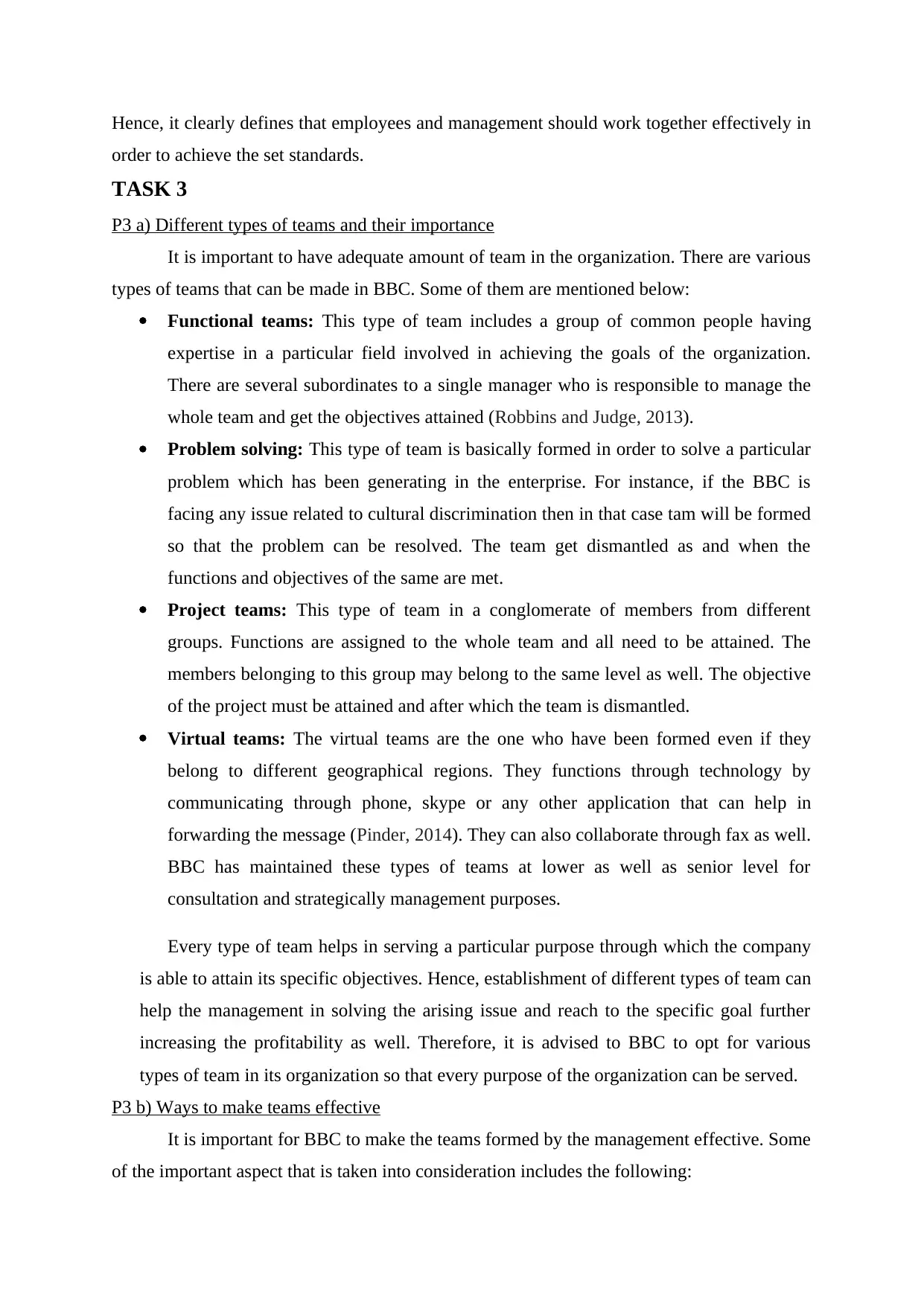
Hence, it clearly defines that employees and management should work together effectively in
order to achieve the set standards.
TASK 3
P3 a) Different types of teams and their importance
It is important to have adequate amount of team in the organization. There are various
types of teams that can be made in BBC. Some of them are mentioned below:
Functional teams: This type of team includes a group of common people having
expertise in a particular field involved in achieving the goals of the organization.
There are several subordinates to a single manager who is responsible to manage the
whole team and get the objectives attained (Robbins and Judge, 2013).
Problem solving: This type of team is basically formed in order to solve a particular
problem which has been generating in the enterprise. For instance, if the BBC is
facing any issue related to cultural discrimination then in that case tam will be formed
so that the problem can be resolved. The team get dismantled as and when the
functions and objectives of the same are met.
Project teams: This type of team in a conglomerate of members from different
groups. Functions are assigned to the whole team and all need to be attained. The
members belonging to this group may belong to the same level as well. The objective
of the project must be attained and after which the team is dismantled.
Virtual teams: The virtual teams are the one who have been formed even if they
belong to different geographical regions. They functions through technology by
communicating through phone, skype or any other application that can help in
forwarding the message (Pinder, 2014). They can also collaborate through fax as well.
BBC has maintained these types of teams at lower as well as senior level for
consultation and strategically management purposes.
Every type of team helps in serving a particular purpose through which the company
is able to attain its specific objectives. Hence, establishment of different types of team can
help the management in solving the arising issue and reach to the specific goal further
increasing the profitability as well. Therefore, it is advised to BBC to opt for various
types of team in its organization so that every purpose of the organization can be served.
P3 b) Ways to make teams effective
It is important for BBC to make the teams formed by the management effective. Some
of the important aspect that is taken into consideration includes the following:
order to achieve the set standards.
TASK 3
P3 a) Different types of teams and their importance
It is important to have adequate amount of team in the organization. There are various
types of teams that can be made in BBC. Some of them are mentioned below:
Functional teams: This type of team includes a group of common people having
expertise in a particular field involved in achieving the goals of the organization.
There are several subordinates to a single manager who is responsible to manage the
whole team and get the objectives attained (Robbins and Judge, 2013).
Problem solving: This type of team is basically formed in order to solve a particular
problem which has been generating in the enterprise. For instance, if the BBC is
facing any issue related to cultural discrimination then in that case tam will be formed
so that the problem can be resolved. The team get dismantled as and when the
functions and objectives of the same are met.
Project teams: This type of team in a conglomerate of members from different
groups. Functions are assigned to the whole team and all need to be attained. The
members belonging to this group may belong to the same level as well. The objective
of the project must be attained and after which the team is dismantled.
Virtual teams: The virtual teams are the one who have been formed even if they
belong to different geographical regions. They functions through technology by
communicating through phone, skype or any other application that can help in
forwarding the message (Pinder, 2014). They can also collaborate through fax as well.
BBC has maintained these types of teams at lower as well as senior level for
consultation and strategically management purposes.
Every type of team helps in serving a particular purpose through which the company
is able to attain its specific objectives. Hence, establishment of different types of team can
help the management in solving the arising issue and reach to the specific goal further
increasing the profitability as well. Therefore, it is advised to BBC to opt for various
types of team in its organization so that every purpose of the organization can be served.
P3 b) Ways to make teams effective
It is important for BBC to make the teams formed by the management effective. Some
of the important aspect that is taken into consideration includes the following:
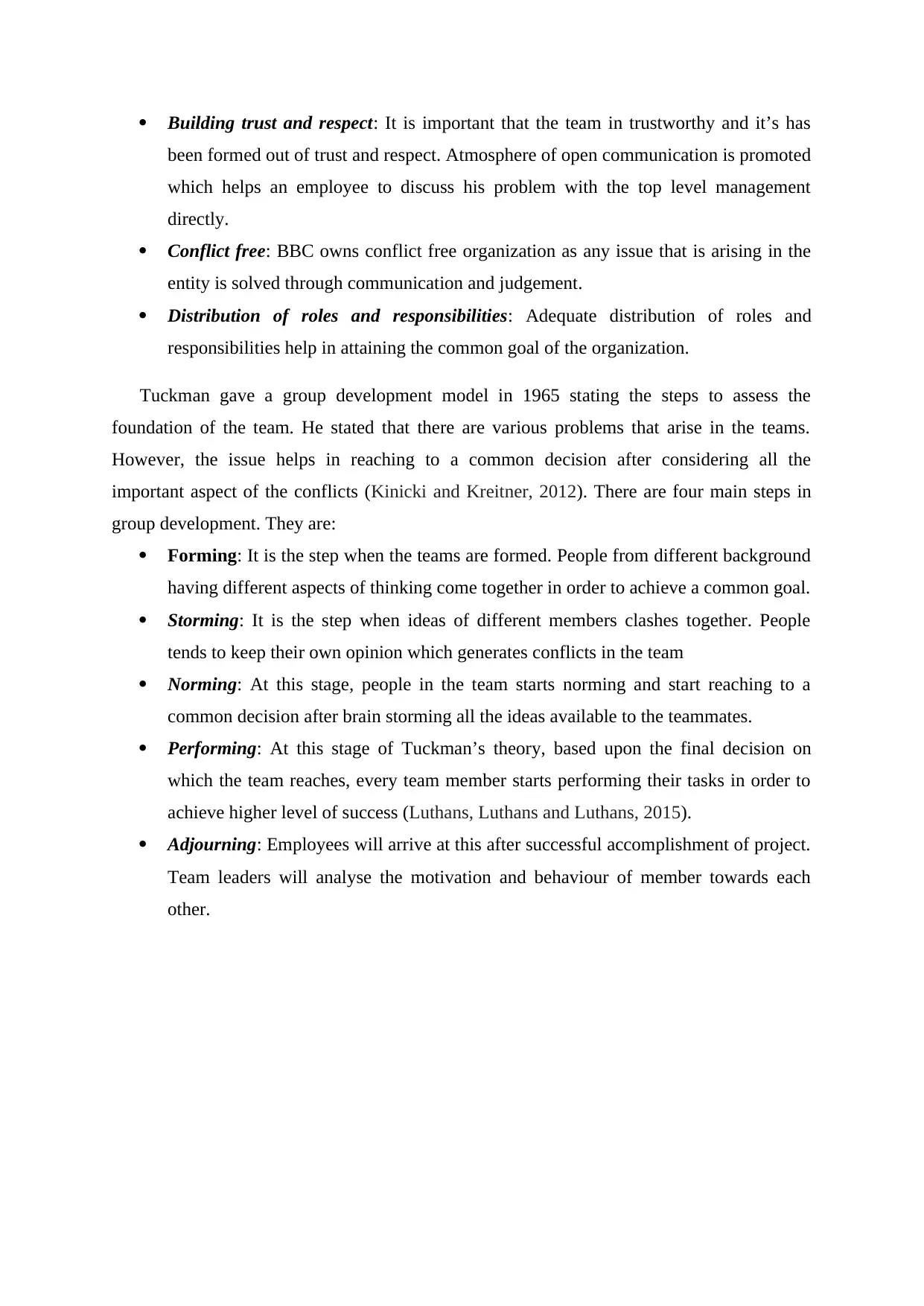
Building trust and respect: It is important that the team in trustworthy and it’s has
been formed out of trust and respect. Atmosphere of open communication is promoted
which helps an employee to discuss his problem with the top level management
directly.
Conflict free: BBC owns conflict free organization as any issue that is arising in the
entity is solved through communication and judgement.
Distribution of roles and responsibilities: Adequate distribution of roles and
responsibilities help in attaining the common goal of the organization.
Tuckman gave a group development model in 1965 stating the steps to assess the
foundation of the team. He stated that there are various problems that arise in the teams.
However, the issue helps in reaching to a common decision after considering all the
important aspect of the conflicts (Kinicki and Kreitner, 2012). There are four main steps in
group development. They are:
Forming: It is the step when the teams are formed. People from different background
having different aspects of thinking come together in order to achieve a common goal.
Storming: It is the step when ideas of different members clashes together. People
tends to keep their own opinion which generates conflicts in the team
Norming: At this stage, people in the team starts norming and start reaching to a
common decision after brain storming all the ideas available to the teammates.
Performing: At this stage of Tuckman’s theory, based upon the final decision on
which the team reaches, every team member starts performing their tasks in order to
achieve higher level of success (Luthans, Luthans and Luthans, 2015).
Adjourning: Employees will arrive at this after successful accomplishment of project.
Team leaders will analyse the motivation and behaviour of member towards each
other.
been formed out of trust and respect. Atmosphere of open communication is promoted
which helps an employee to discuss his problem with the top level management
directly.
Conflict free: BBC owns conflict free organization as any issue that is arising in the
entity is solved through communication and judgement.
Distribution of roles and responsibilities: Adequate distribution of roles and
responsibilities help in attaining the common goal of the organization.
Tuckman gave a group development model in 1965 stating the steps to assess the
foundation of the team. He stated that there are various problems that arise in the teams.
However, the issue helps in reaching to a common decision after considering all the
important aspect of the conflicts (Kinicki and Kreitner, 2012). There are four main steps in
group development. They are:
Forming: It is the step when the teams are formed. People from different background
having different aspects of thinking come together in order to achieve a common goal.
Storming: It is the step when ideas of different members clashes together. People
tends to keep their own opinion which generates conflicts in the team
Norming: At this stage, people in the team starts norming and start reaching to a
common decision after brain storming all the ideas available to the teammates.
Performing: At this stage of Tuckman’s theory, based upon the final decision on
which the team reaches, every team member starts performing their tasks in order to
achieve higher level of success (Luthans, Luthans and Luthans, 2015).
Adjourning: Employees will arrive at this after successful accomplishment of project.
Team leaders will analyse the motivation and behaviour of member towards each
other.
⊘ This is a preview!⊘
Do you want full access?
Subscribe today to unlock all pages.

Trusted by 1+ million students worldwide
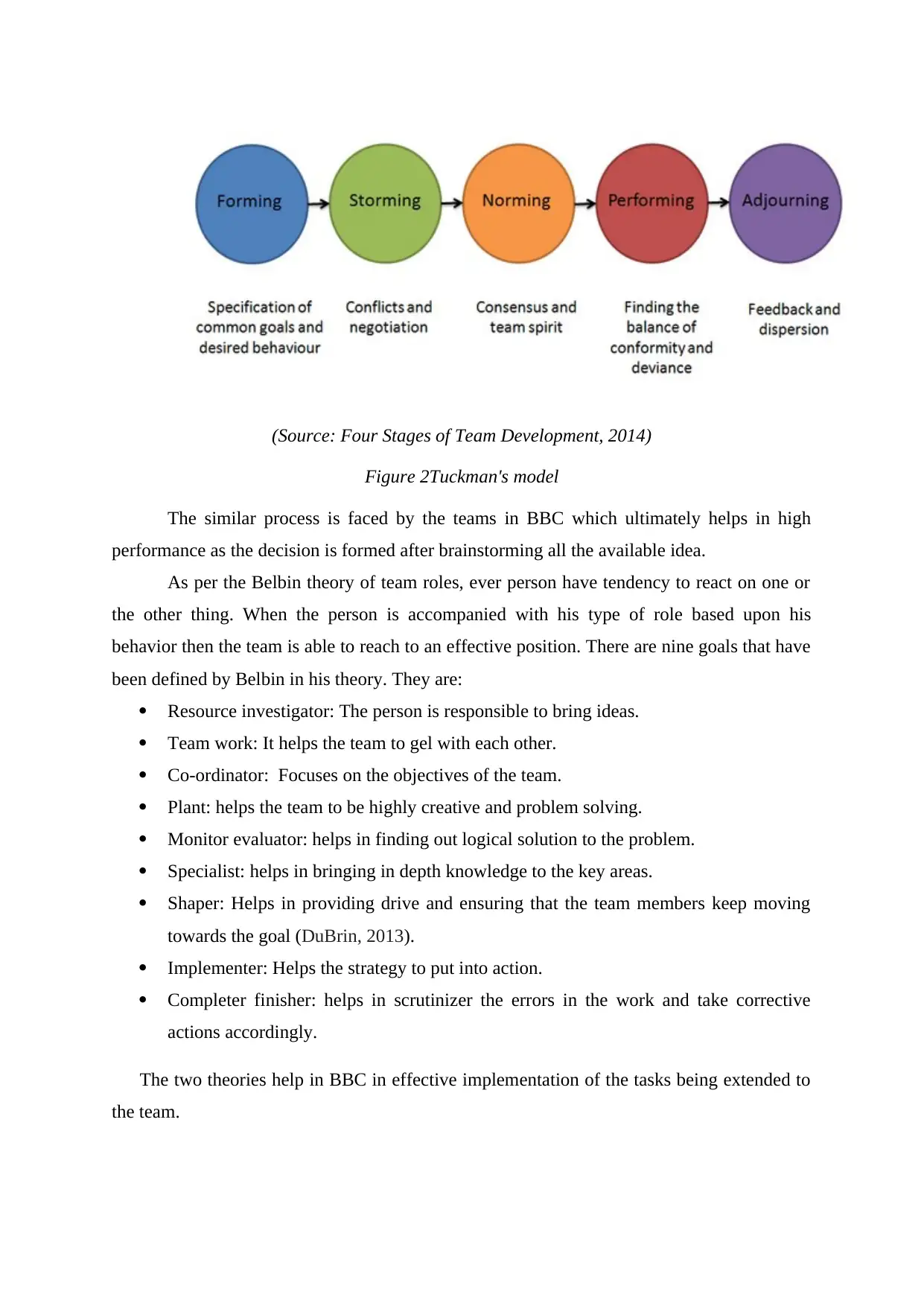
(Source: Four Stages of Team Development, 2014)
Figure 2Tuckman's model
The similar process is faced by the teams in BBC which ultimately helps in high
performance as the decision is formed after brainstorming all the available idea.
As per the Belbin theory of team roles, ever person have tendency to react on one or
the other thing. When the person is accompanied with his type of role based upon his
behavior then the team is able to reach to an effective position. There are nine goals that have
been defined by Belbin in his theory. They are:
Resource investigator: The person is responsible to bring ideas.
Team work: It helps the team to gel with each other.
Co-ordinator: Focuses on the objectives of the team.
Plant: helps the team to be highly creative and problem solving.
Monitor evaluator: helps in finding out logical solution to the problem.
Specialist: helps in bringing in depth knowledge to the key areas.
Shaper: Helps in providing drive and ensuring that the team members keep moving
towards the goal (DuBrin, 2013).
Implementer: Helps the strategy to put into action.
Completer finisher: helps in scrutinizer the errors in the work and take corrective
actions accordingly.
The two theories help in BBC in effective implementation of the tasks being extended to
the team.
Figure 2Tuckman's model
The similar process is faced by the teams in BBC which ultimately helps in high
performance as the decision is formed after brainstorming all the available idea.
As per the Belbin theory of team roles, ever person have tendency to react on one or
the other thing. When the person is accompanied with his type of role based upon his
behavior then the team is able to reach to an effective position. There are nine goals that have
been defined by Belbin in his theory. They are:
Resource investigator: The person is responsible to bring ideas.
Team work: It helps the team to gel with each other.
Co-ordinator: Focuses on the objectives of the team.
Plant: helps the team to be highly creative and problem solving.
Monitor evaluator: helps in finding out logical solution to the problem.
Specialist: helps in bringing in depth knowledge to the key areas.
Shaper: Helps in providing drive and ensuring that the team members keep moving
towards the goal (DuBrin, 2013).
Implementer: Helps the strategy to put into action.
Completer finisher: helps in scrutinizer the errors in the work and take corrective
actions accordingly.
The two theories help in BBC in effective implementation of the tasks being extended to
the team.
Paraphrase This Document
Need a fresh take? Get an instant paraphrase of this document with our AI Paraphraser
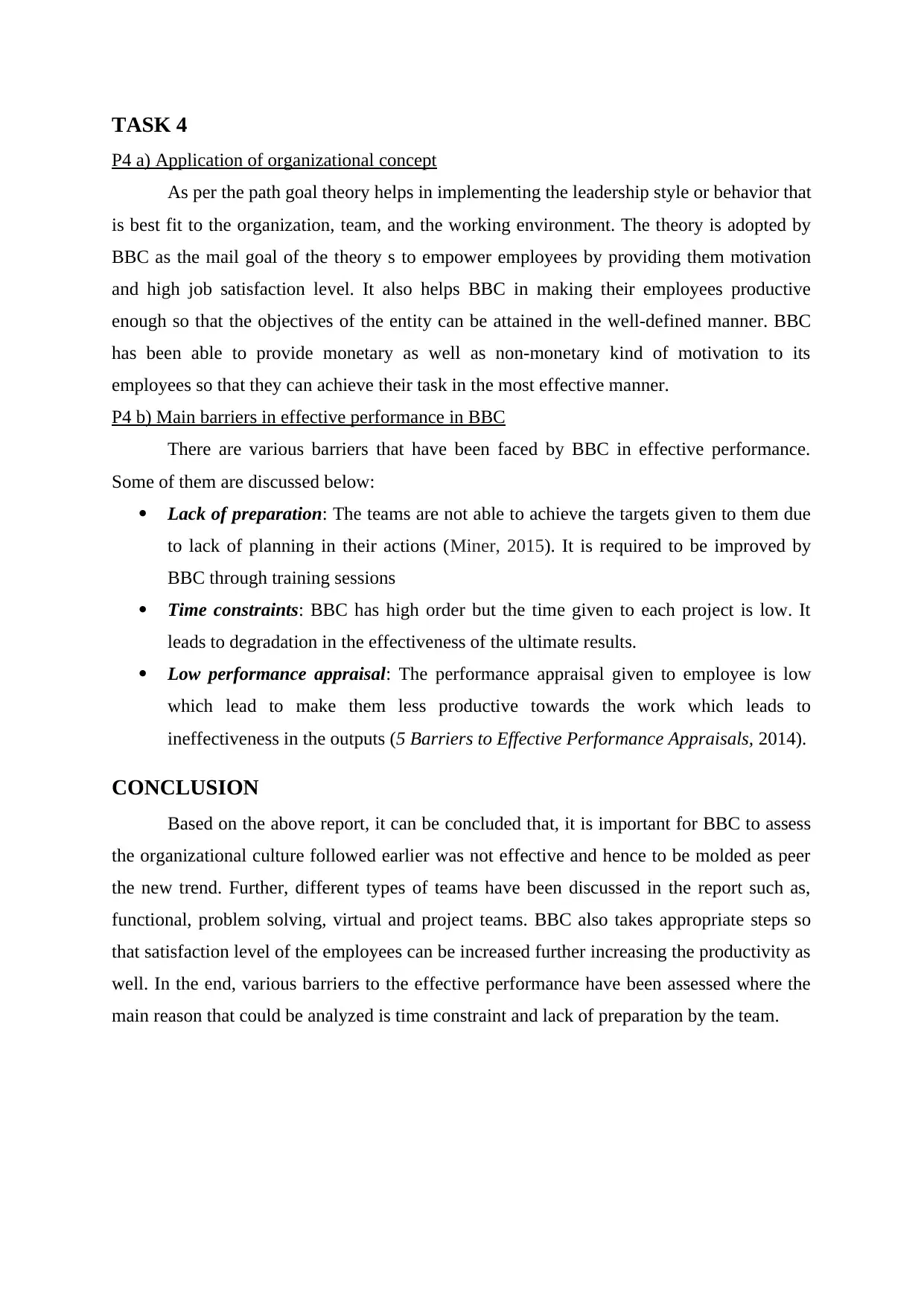
TASK 4
P4 a) Application of organizational concept
As per the path goal theory helps in implementing the leadership style or behavior that
is best fit to the organization, team, and the working environment. The theory is adopted by
BBC as the mail goal of the theory s to empower employees by providing them motivation
and high job satisfaction level. It also helps BBC in making their employees productive
enough so that the objectives of the entity can be attained in the well-defined manner. BBC
has been able to provide monetary as well as non-monetary kind of motivation to its
employees so that they can achieve their task in the most effective manner.
P4 b) Main barriers in effective performance in BBC
There are various barriers that have been faced by BBC in effective performance.
Some of them are discussed below:
Lack of preparation: The teams are not able to achieve the targets given to them due
to lack of planning in their actions (Miner, 2015). It is required to be improved by
BBC through training sessions
Time constraints: BBC has high order but the time given to each project is low. It
leads to degradation in the effectiveness of the ultimate results.
Low performance appraisal: The performance appraisal given to employee is low
which lead to make them less productive towards the work which leads to
ineffectiveness in the outputs (5 Barriers to Effective Performance Appraisals, 2014).
CONCLUSION
Based on the above report, it can be concluded that, it is important for BBC to assess
the organizational culture followed earlier was not effective and hence to be molded as peer
the new trend. Further, different types of teams have been discussed in the report such as,
functional, problem solving, virtual and project teams. BBC also takes appropriate steps so
that satisfaction level of the employees can be increased further increasing the productivity as
well. In the end, various barriers to the effective performance have been assessed where the
main reason that could be analyzed is time constraint and lack of preparation by the team.
P4 a) Application of organizational concept
As per the path goal theory helps in implementing the leadership style or behavior that
is best fit to the organization, team, and the working environment. The theory is adopted by
BBC as the mail goal of the theory s to empower employees by providing them motivation
and high job satisfaction level. It also helps BBC in making their employees productive
enough so that the objectives of the entity can be attained in the well-defined manner. BBC
has been able to provide monetary as well as non-monetary kind of motivation to its
employees so that they can achieve their task in the most effective manner.
P4 b) Main barriers in effective performance in BBC
There are various barriers that have been faced by BBC in effective performance.
Some of them are discussed below:
Lack of preparation: The teams are not able to achieve the targets given to them due
to lack of planning in their actions (Miner, 2015). It is required to be improved by
BBC through training sessions
Time constraints: BBC has high order but the time given to each project is low. It
leads to degradation in the effectiveness of the ultimate results.
Low performance appraisal: The performance appraisal given to employee is low
which lead to make them less productive towards the work which leads to
ineffectiveness in the outputs (5 Barriers to Effective Performance Appraisals, 2014).
CONCLUSION
Based on the above report, it can be concluded that, it is important for BBC to assess
the organizational culture followed earlier was not effective and hence to be molded as peer
the new trend. Further, different types of teams have been discussed in the report such as,
functional, problem solving, virtual and project teams. BBC also takes appropriate steps so
that satisfaction level of the employees can be increased further increasing the productivity as
well. In the end, various barriers to the effective performance have been assessed where the
main reason that could be analyzed is time constraint and lack of preparation by the team.
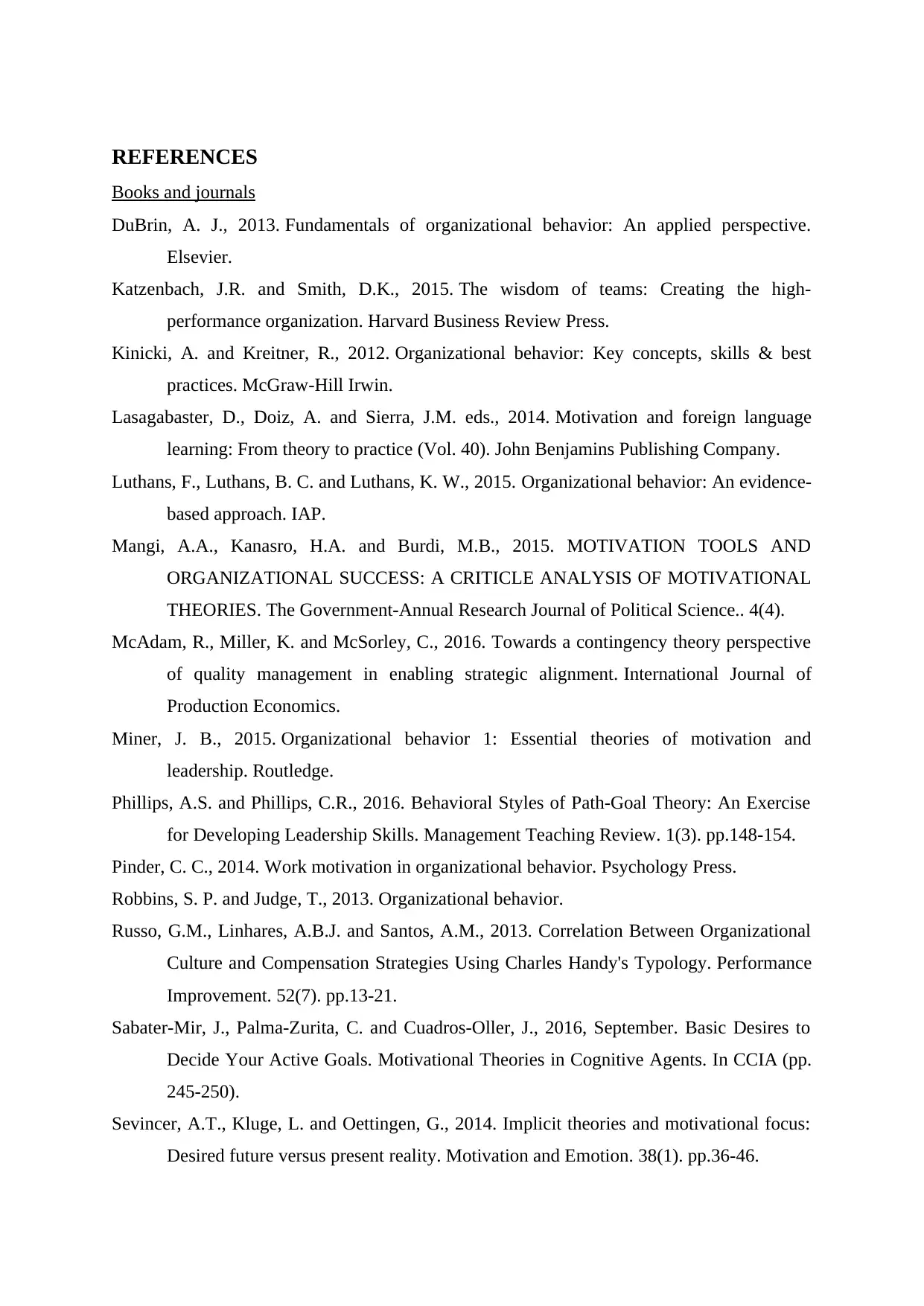
REFERENCES
Books and journals
DuBrin, A. J., 2013. Fundamentals of organizational behavior: An applied perspective.
Elsevier.
Katzenbach, J.R. and Smith, D.K., 2015. The wisdom of teams: Creating the high-
performance organization. Harvard Business Review Press.
Kinicki, A. and Kreitner, R., 2012. Organizational behavior: Key concepts, skills & best
practices. McGraw-Hill Irwin.
Lasagabaster, D., Doiz, A. and Sierra, J.M. eds., 2014. Motivation and foreign language
learning: From theory to practice (Vol. 40). John Benjamins Publishing Company.
Luthans, F., Luthans, B. C. and Luthans, K. W., 2015. Organizational behavior: An evidence-
based approach. IAP.
Mangi, A.A., Kanasro, H.A. and Burdi, M.B., 2015. MOTIVATION TOOLS AND
ORGANIZATIONAL SUCCESS: A CRITICLE ANALYSIS OF MOTIVATIONAL
THEORIES. The Government-Annual Research Journal of Political Science.. 4(4).
McAdam, R., Miller, K. and McSorley, C., 2016. Towards a contingency theory perspective
of quality management in enabling strategic alignment. International Journal of
Production Economics.
Miner, J. B., 2015. Organizational behavior 1: Essential theories of motivation and
leadership. Routledge.
Phillips, A.S. and Phillips, C.R., 2016. Behavioral Styles of Path-Goal Theory: An Exercise
for Developing Leadership Skills. Management Teaching Review. 1(3). pp.148-154.
Pinder, C. C., 2014. Work motivation in organizational behavior. Psychology Press.
Robbins, S. P. and Judge, T., 2013. Organizational behavior.
Russo, G.M., Linhares, A.B.J. and Santos, A.M., 2013. Correlation Between Organizational
Culture and Compensation Strategies Using Charles Handy's Typology. Performance
Improvement. 52(7). pp.13-21.
Sabater-Mir, J., Palma-Zurita, C. and Cuadros-Oller, J., 2016, September. Basic Desires to
Decide Your Active Goals. Motivational Theories in Cognitive Agents. In CCIA (pp.
245-250).
Sevincer, A.T., Kluge, L. and Oettingen, G., 2014. Implicit theories and motivational focus:
Desired future versus present reality. Motivation and Emotion. 38(1). pp.36-46.
Books and journals
DuBrin, A. J., 2013. Fundamentals of organizational behavior: An applied perspective.
Elsevier.
Katzenbach, J.R. and Smith, D.K., 2015. The wisdom of teams: Creating the high-
performance organization. Harvard Business Review Press.
Kinicki, A. and Kreitner, R., 2012. Organizational behavior: Key concepts, skills & best
practices. McGraw-Hill Irwin.
Lasagabaster, D., Doiz, A. and Sierra, J.M. eds., 2014. Motivation and foreign language
learning: From theory to practice (Vol. 40). John Benjamins Publishing Company.
Luthans, F., Luthans, B. C. and Luthans, K. W., 2015. Organizational behavior: An evidence-
based approach. IAP.
Mangi, A.A., Kanasro, H.A. and Burdi, M.B., 2015. MOTIVATION TOOLS AND
ORGANIZATIONAL SUCCESS: A CRITICLE ANALYSIS OF MOTIVATIONAL
THEORIES. The Government-Annual Research Journal of Political Science.. 4(4).
McAdam, R., Miller, K. and McSorley, C., 2016. Towards a contingency theory perspective
of quality management in enabling strategic alignment. International Journal of
Production Economics.
Miner, J. B., 2015. Organizational behavior 1: Essential theories of motivation and
leadership. Routledge.
Phillips, A.S. and Phillips, C.R., 2016. Behavioral Styles of Path-Goal Theory: An Exercise
for Developing Leadership Skills. Management Teaching Review. 1(3). pp.148-154.
Pinder, C. C., 2014. Work motivation in organizational behavior. Psychology Press.
Robbins, S. P. and Judge, T., 2013. Organizational behavior.
Russo, G.M., Linhares, A.B.J. and Santos, A.M., 2013. Correlation Between Organizational
Culture and Compensation Strategies Using Charles Handy's Typology. Performance
Improvement. 52(7). pp.13-21.
Sabater-Mir, J., Palma-Zurita, C. and Cuadros-Oller, J., 2016, September. Basic Desires to
Decide Your Active Goals. Motivational Theories in Cognitive Agents. In CCIA (pp.
245-250).
Sevincer, A.T., Kluge, L. and Oettingen, G., 2014. Implicit theories and motivational focus:
Desired future versus present reality. Motivation and Emotion. 38(1). pp.36-46.
⊘ This is a preview!⊘
Do you want full access?
Subscribe today to unlock all pages.

Trusted by 1+ million students worldwide
1 out of 13
Related Documents
Your All-in-One AI-Powered Toolkit for Academic Success.
+13062052269
info@desklib.com
Available 24*7 on WhatsApp / Email
![[object Object]](/_next/static/media/star-bottom.7253800d.svg)
Unlock your academic potential
Copyright © 2020–2026 A2Z Services. All Rights Reserved. Developed and managed by ZUCOL.





